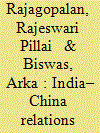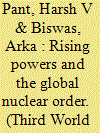|
|
|
Sort Order |
|
|
|
Items / Page
|
|
|
|
|
|
|
| Srl | Item |
| 1 |
ID:
156947


|
|
|
|
|
| Summary/Abstract |
William W. Kaufmann assessed the efficacy of the United States' strategy of massive retaliation, introduced in January 1954 by then Secretary of State John F. Dulles, on three areas: capability, cost, and intention. Having established parity between New Delhi's current interpretation of massive retaliation and that of Dulles in 1954, this article applies Kaufmann's framework to gauge the credibility of India's strategy of massive retaliation. Taking cognizance of current developments in India–Pakistan relations and of India's evolving strategic priorities, this article argues that conditions neither exist nor could be created for massive retaliation to be a credible strategy of nuclear deterrence for India.
|
|
|
|
|
|
|
|
|
|
|
|
|
|
|
|
| 2 |
ID:
152280


|
|
|
|
|
| Summary/Abstract |
This article analyses the contrary approaches and perceptions of India and China across the economic, political and military domains including the unresolved border and territorial issues, China’s South Asia policy, military modernisation and nuclear competition, border infrastructure and its impact on military build-up in the border areas. In particular, the article investigates how India–China relations have changed under Chinese President Xi Jinping. Although some continuity is discerned in China’s policies, there is also greater aggressiveness and more vigorous efforts to balance India on China’s part.
|
|
|
|
|
|
|
|
|
|
|
|
|
|
|
|
| 3 |
ID:
141910


|
|
|
|
|
| Summary/Abstract |
The military and scientific leadership of Pakistan has given clear signals that tactical nuclear weapons have a vital role in Pakistan’s nuclear weapons policy. Developed to lower Pakistan’s nuclear threshold, these weapons may further deter India from launching a conventional strike to punish Pakistan for its sub-conventional war against India. This has led to a debate on the possible doctrinal responses that India could adopt to counter Pakistan’s tactical nuclear weapons. India could either make its current doctrine of massive retaliation more credible by appropriate signalling or it could revise the doctrine and develop its options of proportionate retaliation. Considering the limitations of both these options, the article argues for developing a doctrinal response that prescribes neither proportionate nor massively disproportionate retaliation.
|
|
|
|
|
|
|
|
|
|
|
|
|
|
|
|
| 4 |
ID:
156280


|
|
|
| 5 |
ID:
163365


|
|
|
|
|
| Summary/Abstract |
The global nuclear order has been built around the Treaty on the Non-Proliferation of Nuclear Weapons (NPT), primarily aimed at addressing the challenges of nuclear non-proliferation. In the last two decades, this order has faced growing challenges from the demands of emerging nuclear powers which it has been unable to meet effectively. These powers have either been outside the order, like India, Israel and Pakistan, or withdrawn from it, like North Korea, or could leave in future due to arguably compelling security concerns, like Iran, Japan and South Korea. These nations and the challenges they pose to the global nuclear order are mostly considered unique and are treated as exceptional. This paper examines the case of India which has found partial acceptance into the extant order from being a pariah nuclear state outside the NPT to a de facto nuclear weapon state designated by the US–India civil nuclear cooperation pact of 2008. It explicates the ongoing process of its integration into the order, underlining why this task remains daunting. Other than factors unique to India, the case of its rise in the global nuclear order captures the structural shortcomings of the extant order. While these underlying shortcomings remain, new nuclear powers, with or without support from the established ones, are likely to challenge the order in future.
|
|
|
|
|
|
|
|
|
|
|
|
|
|
|
|
|
|
|
|
|